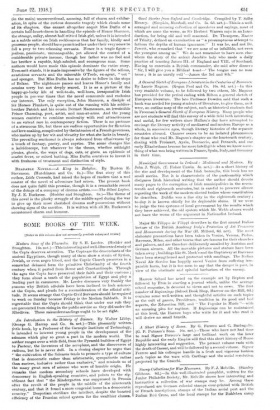FICTION.
OVER HERE.t
Arita a positive glut of political Irish novels, it is something of a relief to come across one from which politics are wholly •excluded. But the attractions of Over Here are not merely negative. It is • A Spiritual Aeneiti. By Ronald Knox, late of Trinity College, Oxford. London; Longmont; and Co. [re. Sd. net.] t Over Here. By Helen Diann. London Methuen and-co. [6'.l (in the main) unconventional, amusing, full of charm and exhilar- ation, in spite of the curious domestic tragedy which clouds some of its chaRters. One cannot altogether acquit Miss Duffin of a certain half-heartedness in handling the episode of Honor Shannon, the strange, sulky, almost half-witted Irish girl, unless it is intended as a subtle satire on Irish recklessness that her family, kindly and generous people, should have permittedher under their very noses to fall a prey to two scheming servants. Honor is a tragic figure— jealous, passionate, unmanageable, yet allowed the control of a considerable private income, though her father was no fool and her brother a capable, high-minded, and courageous man. Some authors would have made this episode dominate the entire story. Even asit stands, itis made impreseiveby the figures of the odious, avaricious servants and the miserable O'Toole, ex-agent, " vet " and sponger. But Miss Duffin has no desire to follow in the steps of Balzac. The nightmare passes and leaves Honor's family and cousins sorry but not deeply seared. It is as a picture of the happy-go-lucky life of well-to-do, well-born, irresponsible Irish people in pre-war times that the novel commands and enchains our interest. The only exception, John Shannon, a disciple of Sir Horace Plunkett, is quite out of the running with his soldier- brother Patrick and his cousin Dermot Macnamara, an irresistible Prince Charming, poet, artist, and man-at-arms. And the young women contrive to combine modernity with real attractiveness to an extent rare in contemporary fiction. There is no pretence of a strenuous life, but there are endless opportunities for flirtation and love-making, complicated by theintrusion of a French governess, who makes up by her wit and vivacity for what she lacks in beauty. The prevailing sentiment is always redeemed from effusiveness by a touch of fantasy, poetry, and caprice. The scene changes like a kaleidoscope, but whatever be the theme, whether midnight picnics, ghosts, the ways of dogs, cats, or goats, an epidemic of scarlet fever, or mixed bathing, Miss Duffin contrives to invest it with freshness of treatment and distinction of style.



































 Previous page
Previous page